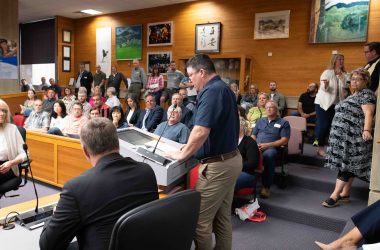The Salem City Council on Tuesday passed a resolution on the crisis in Gaza, calling for an immediate and permanent ceasefire, the release of Israeli hostages and the end of U.S. aid directed to Israel or the Israel Defense Force until there is a ceasefire.
How the council voted
Councilors Jose Gonzalez, Virginia Stapleton, Linda Nishioka and Trevor Philips joined Mayor Chris Hoy in voting to pass the Gaza resolution. Councilors Deanna Gwyn, Micki Varney, Julie Hoy, and Vanessa Nordyke voted against it.
The resolution ultimately adopted after three hours of public testimony did not use the word “genocide” to describe Israel’s actions in Gaza. The language had been included in an earlier draft from the city’s Human Rights Commission.
Dozens of Salemites spoke, including Jewish and Muslim residents and people of Arab and Palestinian origin.
Over 20 people submitted written testimony to the council.
Many speakers implored the council to pass the draft referencing genocide, including a written petition submitted with over 400 signatures.
Max Moran, a Jewish student at Willamette University, said his great-grandfather’s experience escaping the Holocaust and losing his family to the Nazis has colored the way he views the situation in Gaza.
“The terrorist attacks on October 7 were evil. This is not a reasonable response. This is not a war. It is a massacre. It is a genocide,” Moran said. “I know many of my fellow Jews find it impossible to imagine that we, as the people whose experience gave birth to the word genocide, could inflict such pain on others.”
Moran urged councilors to accept the original wording put forward by the commission.
“Accepting what Israel has done in our names as Jews, forever transforms how you understand what it means to be Jewish,” Moran said. “It requires us to face some very bleak and very confusing realities. I understand why someone might instead choose denial … if we wrap ourselves in denial that is an act of unforgivable weakness.”
State Sen. Deb Patterson, D-Salem, submitted a letter supporting the original resolution.
Rabbi Avrohom Y. Perlstein of Salem’s Chabad Center for Jewish Life, said the resolution was filled with false information and ignored the role Hamas has played in perpetuating civilian suffering in Gaza.
“The City of Salem has no business chiming in on geo-political conflicts that it can do nothing about. If the city feels it needs to declare its concern for human suffering, please feel free to do so, but include all human suffering. Don’t single out one state, which is tied to a specific minority demographic, that has suffered at the hands of every country it has lived in over the past 2200 years, and is currently experiencing a rise of hate directed towards them,” he wrote.
Sarah El Ebiary, a Muslim resident with family in Palestine, wrote in favor of the resolution.
“I have family currently living over there in Palestine, 47 people all huddled in one apartment together, and I check daily for their social media posts,” El Ebiary said. “Thankful to see updates that 1, they’re not dead yet and 2, they still have internet or electricity.”
Others expressed concern with how the process unfolded in the human rights commission, and said Jewish voices were silenced during the crafting of the resolution.
Joel Rosenblit, a Jewish resident, said he condemns the carnage in Gaza, but still does not believe the city should pass a resolution given how the human rights commission conducted the process.
“As a Jew in Salem I do not feel safe with the rise of antisemitism and the hostility to Jews in Israel. I support two states. Israel and Palestine,” Rosenblit said. “The human rights commission made my insecurities worse by the way they conducted the hearings.”
Michael Slater, another Jewish resident, called the city to investigate the human rights commission for the way it conducted itself. Slater said the commission created a hostile environment for Jewish community members who sought to participate in the process of crafting the resolution.
“The commission openly favored the view of one group, advanced their agenda, belittled representatives of another group, and made no effort to create a dialogue between groups with opposing views,” Slater said.
Gary Ellison, a rabbi and an instructor at Willamette University, urged the city council to table the matter.
“While I understand and acknowledge the passion and commitments which inspired the committee’s resolution regarding a ceasefire in Gaza,” Ellison said. “I would ask that the council proceed with great care in considering the impact of this resolution on some of the very citizens of this community that the (Human Rights Commission) was created to serve.”
The resolution that was ultimately adopted after hours of emotional public testimony and discussion among council members was drafted by Councilors Virginia Stapelton and Linda Nishioka.
Their version was inspired by the language recommended by the human rights commission, which was drafted and submitted to council at Mayor Chris Hoy’s request after weeks of deliberations.
“We condemn Hamas’ terrorist attacks on Israeli citizens that took place on October 7, 2023 and tragically took the lives of over 1,200 and resulted in around 250 hostages,” the adopted resolution said. “We share dire concerns with the atrocities in Gaza in which tens of thousands of Palestinians have been killed and several thousand more are reported missing and presumed to be dead.”
The resolution also says that “the use of civilian infrastructure by Hamas for military purposes further endangers the lives of innocent Palestinians and exacerbates the humanitarian crisis in Gaza.”
Mallory Turner, a Muslim resident of Salem, said she was most impressed by the version of the resolution passed by the council.
“As a Muslim I need to know that the council is committed to my Muslim, Jewish and Palestinian siblings in Salem specifically,” Turner said. “Especially just after reading and hearing the public comments sent by our Jewish neighbors. I think it is imperative that the resolution condemns antisemitism.”
Leading up to the vote, Stapleton provided emotional testimony, expressing her gratitude to her colleagues.
“No matter what happens tonight, I feel like we will be hated. That we will be made the scapegoats and the landing place for a lot of big feelings,” Stapleton said. “Know that I see the humanity in each of you and I value you.”
Stapleton said she was dismayed by what she called physical intimidation tactics employed by certain individuals and said the council had received threats.
Stapleton ultimately voted to adopt the resolution she helped draft.
Councilor Deanna Gwyn voted no on the resolution.
“I believe that for me to agree to one of these resolutions, to any of them frankly, is succumbing to bullying and I can’t go there,” Gwyn said.
Councilor Julie Hoy, the city’s mayor-elect, said she did not believe weighing in on the matter was within the city’s purview and said she was disappointed by the process undertaken by the human rights commission.
“The human rights commission should be providing a safe space for such conversations and that did not happen. I too am disappointed in that. It is a horrible topic and unfortunately it’s not new. It’s generational and horrible,” Julie Hoy said. “My heart breaks for those who have to live in that kind of fear. I can’t feel good about a resolution today. Not with how this has all unfolded.”
Mayor Chris Hoy said he believes the human rights commission had good intentions but was not totally satisfied with how matters unfolded. He said he supported the city weighing in.
“I appreciate the councilors who said that they think we shouldn’t take a stance. But I disagree. I feel like we should,” Chris Hoy said. “I feel like we take a stand on a lot of things. We lend our leadership, we lend our voice. I do think we should take a stand of some sort.”
Joaquín Lara Midkiff, a member of the city’s human rights commission, testified in support of the commission’s conduct and the draft resolution, which described Israel’s actions in Gaza as genocide. He argued that the matter is primarily but not exclusively about the question of the effect of local tax dollars on the lives of people in Gaza.
“We need to be free to use the most accurate language available to us in describing the circumstances of the world,” Midkiff said. “If we cannot with any specificity name our present then we are prohibited from putting language to a future, and our ability to render that more peaceful future is made immaterial.”
Contact reporter Joe Siess: [email protected] or 503-335-7790.
A MOMENT MORE, PLEASE – If you found this story useful, consider subscribing to Salem Reporter if you don’t already. Work such as this, done by local professionals, depends on community support from subscribers. Please take a moment and sign up now – easy and secure: SUBSCRIBE.

Joe Siess is a reporter for Salem Reporter. Joe joined Salem Reporter in 2024 and primarily covers city and county government but loves surprises. Joe previously reported for the Redmond Spokesman, the Bulletin in Bend, Klamath Falls Herald and News and the Malheur Enterprise. He was born in Independence, MO, where the Oregon Trail officially starts, and grew up in the Kansas City area.









